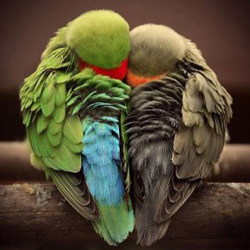 Scientists have long accused pet owners of anthropomorphism which is the act of attributing the human characteristics of thought, feeling and consciousness to pets. Even though supporting the notion of animals having emotions is the equivalent of committing heresy in the scientific world, there is an increasing acceptance that animals do have and feel emotions.
Scientists have long accused pet owners of anthropomorphism which is the act of attributing the human characteristics of thought, feeling and consciousness to pets. Even though supporting the notion of animals having emotions is the equivalent of committing heresy in the scientific world, there is an increasing acceptance that animals do have and feel emotions.
From the pet owner's perspective, humankind is not alone in it's ability to think and feel. Anyone who has lived with a parrot knows that they not only have an amazing intellectual ability but also a desire for companionship and the capacity to feel and express emotion. Every day the evidence is right before our eyes, our parrots emotions are expressed through their eyes, body posture, behavior and vocalizations which are often verbal.
The bond we have with our birds is primarily one of emotion and it is this emotional relationship that enriches our lives. Does this emotional interaction have the same impact on our parrots? We just don't know for certain but for that matter, do we even really know what another human being feels?
Our birds have the ability to demonstrate a host of emotions:
- Love - as expressed by their eagerness to be close to their "chosen one", desire to be touched, excitement when you enter the room and through their contact calls.
- Fear - primal emotion common to all animals that in birds triggers an automatic defensive behavior such as escape flight.
- Joy - as expressed through vocalizations and body language especially when their owner returns home and through their independent play activities and vocalizations (singing, whistling)
- Loneliness - most often indicated by development of stereotypical behaviors when deprived of social contact and companionship.
- Boredom - most often indicated by development of stereotypical behaviors when lacking in mental stimulation and play opportunities.
- Grief - a parrot often acts depressed or listless when an owner or mate dies
- Jealousy - perhaps with the arrival of a new family member (i.e., baby, spouse, another pet)
- Anger - as demonstrated via body language or a provoked or unprovoked bite.
- Distrust - wariness of a stranger
Many parrot owners have also reported that their parrots, especially African Greys, are very empathic which is the capacity to understand another's 'state of mind' or emotions. Parrots are very sensitive to our emotions, sometimes better than we are. Our birds are keen observers of our facial expressions, body language, tone and even energy levels and therefore we have to be cognizant of how our emotions can impact our birds. If our home life and relationships are stressful our birds will pick up on this and may feel threatened and start exhibiting negative behaviors. The emotional health of all members within the human flock can influence a bird's sense of security.
If we pay equal attention to the clues they provide us through their actions, tone and body language perhaps we can better understand and address our bird's emotional needs.



















































































































































Comments (1)
Comments powered by CComment